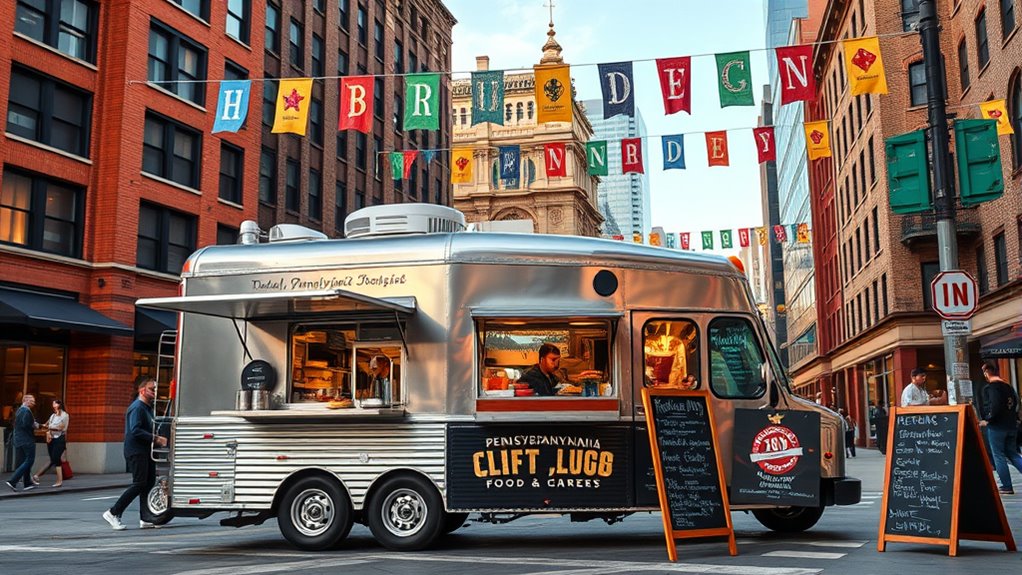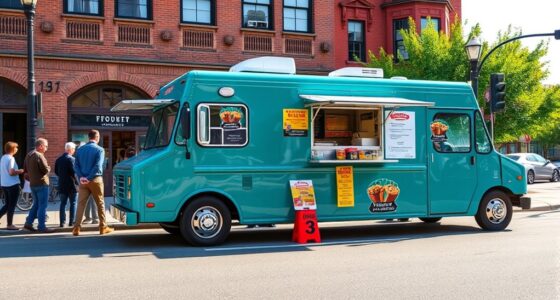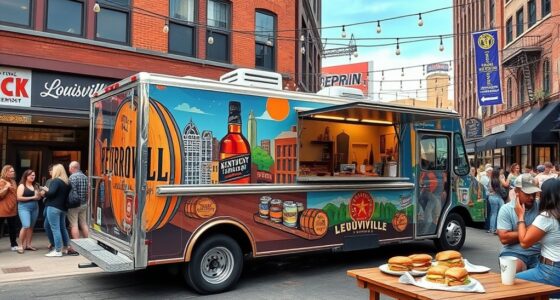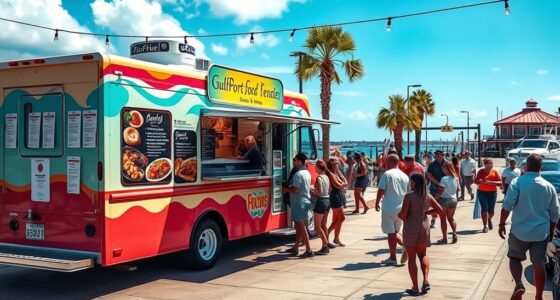To open a food truck in Pittsburgh, you’ll need to secure permits like a Mobile Vehicle Vendor License, follow health and safety rules, and operate from a licensed commissary kitchen. Consider costs from $8,000 used trucks to $175,000 for new custom builds, plus licensing and inventory expenses. Find suitable vending zones, develop a menu that meets safety standards, and use marketing strategies like social media to attract customers. Keep exploring to learn how to navigate each step smoothly.
Key Takeaways
- Obtain necessary permits such as Mobile Vehicle Vendor License, health inspections, and commissary approval, with zoning considerations in mind.
- Budget $40,000 to $150,000 for truck purchase, equipment, licensing, inventory, and ongoing operational expenses.
- Develop a compliant menu focusing on food safety, hazardous food handling, and FDA guidelines, with proper equipment and staff certification.
- Use social media, participate in local events, and create strong branding to attract customers and identify high-traffic vending locations.
- Engage with the Pittsburgh community through festivals, partnerships, and quality service to build loyalty and ensure legal compliance.
Navigating Permits and Licensing in Pittsburgh
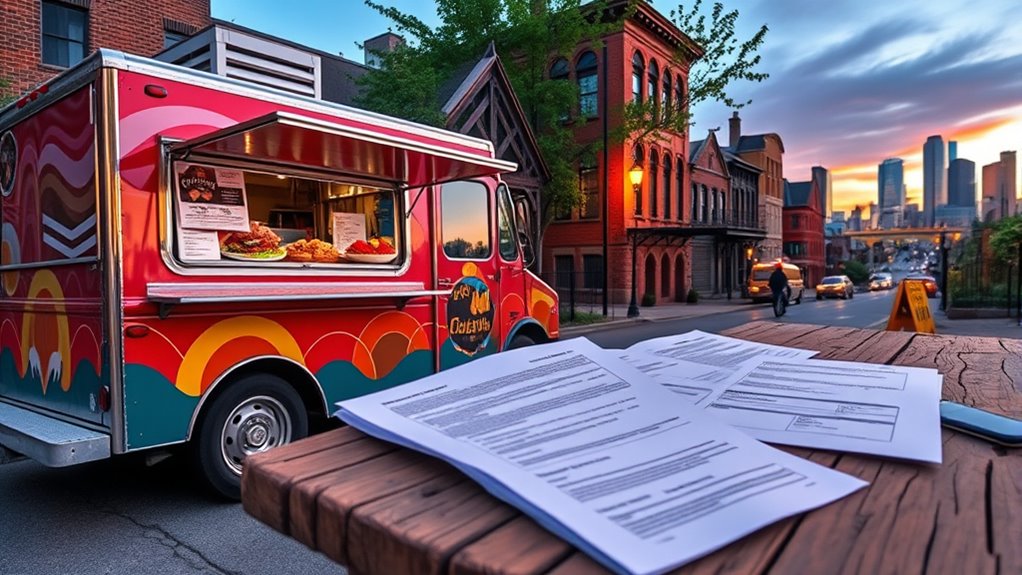
To legally operate a food truck in Pittsburgh, you need to navigate a series of permits and licenses. First, obtain a Mobile Vehicle Vendor License from the Pittsburgh Business Development Department, which involves submitting an application form, food safety certification, and paying a fee. The process includes a background check, and you’ll need to renew this license annually. You must also pass health inspections by the Allegheny County Health Department, ensuring your truck meets sanitation and safety standards. Operating from a licensed commissary kitchen is mandatory, with regular inspections and log entries required. Additionally, you need a general business license from the city, plus possible permits like the Mobile Food Facility license and temporary event permits. Fire safety and zoning regulations also apply, so staying compliant is essential to keep your food truck legal. Renewing the license annually is crucial for maintaining legal status and avoiding penalties, and keeping track of deadlines helps ensure continuous operation.
Understanding the Costs of Starting Your Food Truck Business
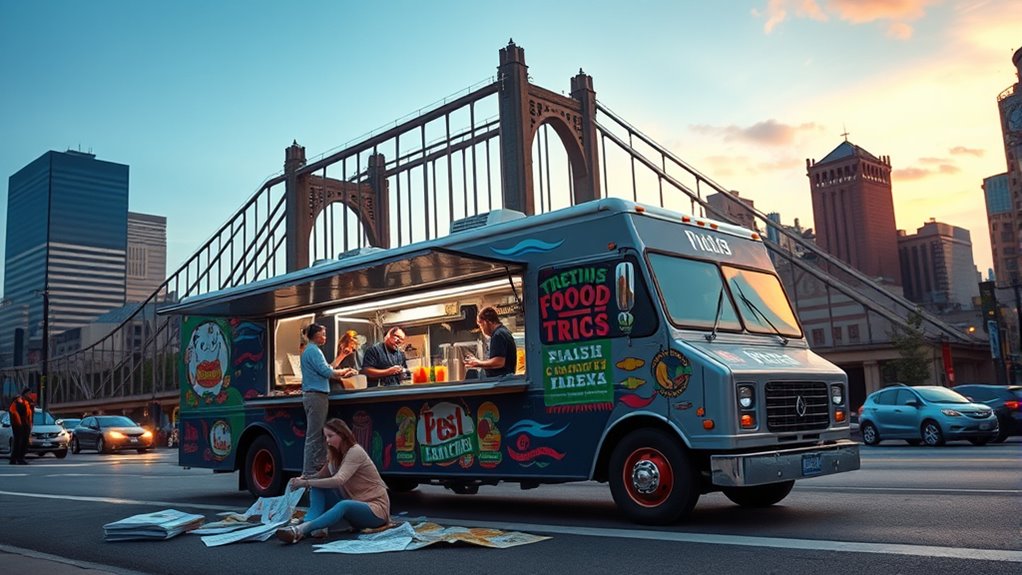
Starting a food truck business requires a clear understanding of the costs involved, from purchasing your vehicle to obtaining necessary permits. The initial investment for a food truck in the U.S. ranges from $40,000 to $150,000, with new or customized trucks costing up to $175,000. Used trucks or carts can be found for as low as $8,000, while fully equipped trucks typically cost around $85,000 locally. Equipment expenses average $45,000 for kitchen appliances, refrigeration, and tools. Licensing in Pennsylvania costs about $241 for a mobile food facility and $165 for a food retail license. Startup inventory, including ingredients and disposables, ranges from $2,000 to $3,000. Additional costs include insurance, permits, marketing, and ongoing supplies, all essential for a successful launch. Proper planning and budgeting can help ensure your food truck venture remains financially sustainable.
Complying With Health and Safety Regulations

Ensuring your food truck meets health and safety regulations is a vital step before hitting the streets. You must pass an annual inspection by the Allegheny County Health Department, which checks sanitation, equipment, and food safety standards. At least one person on your team needs a Food Protection Manager Certification to oversee safe handling. You’ll also need a licensed commissary kitchen for food prep, storage, and cleaning, with proper documentation. Your truck must have compliant refrigeration and heating equipment approved by NSF or similar standards. Proper water sources, sanitary waste disposal, and pest-proof design are essential. All equipment must be commercial-grade, and food contact surfaces require regular cleaning and sanitizing. Mobile food facilities are classified into four classes based on menu complexity, which determines specific safety requirements. Following these regulations guarantees your food remains safe and your business stays compliant.
Finding the Right Locations and Zoning Approvals

To find the best spots for your food truck, you need to understand Pittsburgh’s zoning rules and where vending is permitted. You’ll also need to secure permissions for operating on private property. Managing these regulations guarantees your truck stays compliant and avoids costly penalties. Additionally, researching best locations for food trucks can help maximize visibility and sales in your target area.
Zoning Regulations Overview
Walking Pittsburgh’s zoning regulations is essential for placing your food truck in the right location and obtaining necessary approvals. You need to understand movement restrictions, like staying no longer than four hours in one spot and moving every 30 minutes in some areas. These rules aim to reduce congestion and support brick-and-mortar businesses. Parking at meters downtown is prohibited, limiting options in central zones. Fire safety compliance is mandatory if you use cooking equipment, requiring inspections, fire extinguishers, and overhead protection. Certain zones, like residential or school areas, need special permits. Additionally, operating in historic or commercial zones may be restricted. Ensure you coordinate with city agencies, secure permits, and plan for zoning reviews, which can take four to six weeks before opening. Incorporating zoning regulations into your planning can help prevent costly delays and ensure compliance.
Permitted Vending Zones
Looking for the right spots to operate your food truck in Pittsburgh? The city designates vending zones on public property through the Street and Sidewalk Vending Site Designation Committee, which reviews and approves locations like sidewalks and street corners for safety and pedestrian flow. You must use approved metered parking spaces, avoiding unapproved areas such as downtown meters, unless legislative reforms change that rule. Your operation is limited to these approved zones, and you can’t freely choose any public spot. Regulations require you to move your truck every 30 minutes and maintain at least 500 feet from similar brick-and-mortar businesses. Temporary vending at city events or markets is possible with special permits, offering flexibility outside standard zones. Ensuring compliance with vending regulations is essential for a successful business.
Private Property Permissions
Ever wondered how to secure the right locations for your food truck on private property in Pittsburgh? You’ll need permission from property owners, typically through written consent or lease agreements. Make sure your operation complies with city zoning laws, especially in residential or mixed-use areas—these often require site-specific approvals. Contact building management or property managers to coordinate and address operational requirements. Verify the zoning classification of the property, such as commercial or industrial, before setting up. Some zones restrict food trucks unless special permissions are granted. Negotiate lease terms clearly, covering hours, location, and maintenance. Also, coordinate with local fire and health departments for safety inspections and permits. Proper planning ensures your food truck operates legally and smoothly on private land.
Crafting a Menu That Meets Food Safety Standards
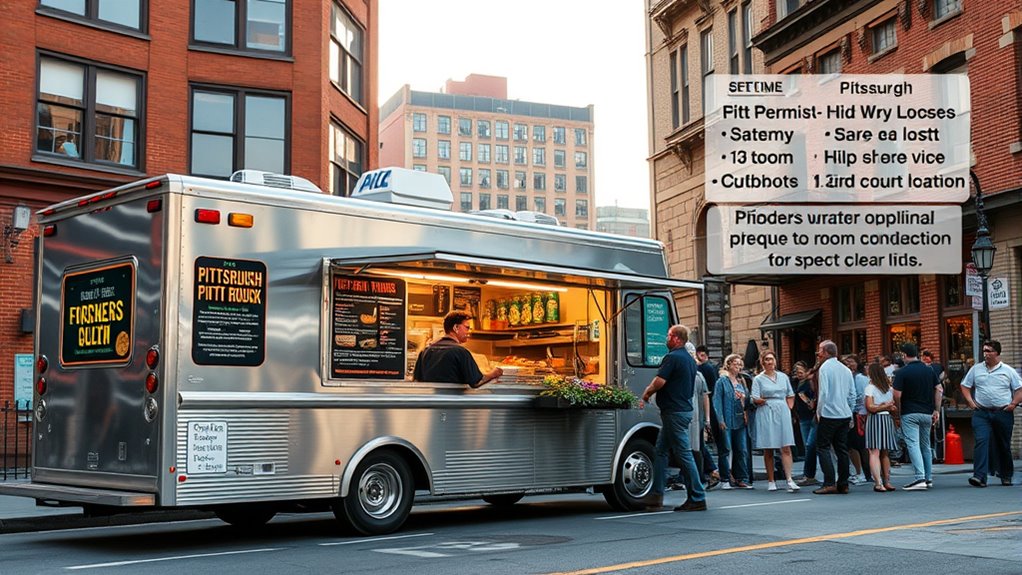
Creating a food truck menu that meets food safety standards starts with understanding the specific regulations set by Pennsylvania and Allegheny County. You need to guarantee menu items comply with handling and preparation rules for mobile food facilities, which influence your permit requirements and commissary use. Focus on managing potentially hazardous foods and TCS items by following FDA FATTOM principles to prevent bacterial growth. Be mindful of your equipment choices—using NSF or equivalent appliances—and ensure proper storage, including cold, dry, and hot holding areas. Your menu design should consider your storage capacity and equipment limitations. Additionally, all staff handling food must be trained, licensed, and follow strict hygiene protocols. Proper temperature control and sanitation practices are essential to keep your menu safe and compliant during every stage of preparation and service. Adhering to these food safety standards will help prevent violations and protect your customers’ health. Furthermore, understanding vegetarian options can expand your menu’s appeal and cater to diverse dietary preferences, ensuring your offerings are inclusive and safe for all customers.
Developing Effective Marketing and Branding Strategies

Developing effective marketing and branding strategies is essential for standing out in Pittsburgh’s competitive food truck scene. You should leverage social media, with Facebook leading, as it can boost sales by 20% and increase customer spending by 15%. Regular updates, high-quality photos, and storytelling help build your brand’s identity. Participating in local events and festivals exposes your truck to diverse audiences and fosters community relationships that online efforts can’t match. Consider implementing loyalty programs to encourage repeat visits, which can increase customer retention by 30%. Use targeted branding elements like logos and distinctive truck designs to enhance recognition. Analyzing local demographics and choosing strategic locations will help tailor your marketing efforts for maximum impact. The global food truck market was valued at approximately $1.1 billion in 2020, with a CAGR of 6.4% from 2021 to 2028, and combining digital and community-focused tactics will set your food truck apart in Pittsburgh. Incorporating visual branding strategies such as cohesive color schemes and custom signage can significantly improve your truck’s visibility and appeal.
Tips for Successful Operations and Community Engagement

Effective operations and community engagement are essential to your food truck’s success in Pittsburgh. Use data analytics to understand customer preferences, optimize your menu, and reduce waste. Plan your locations based on foot traffic and event calendars to boost sales. Leverage social media insights to target your promotions effectively. Manage labor costs with scheduling tools, cross-train staff, and maintain equipment to prevent breakdowns. Route planning helps identify high-traffic spots and secure permits. Focus on quality by sourcing fresh ingredients and regularly updating your menu to keep customers excited. Engage with the community by participating in festivals, partnering with local suppliers, and supporting local causes. Building these practices creates a strong local presence, fosters loyalty, and drives long-term success for your Pittsburgh food truck. Community engagement can also enhance your reputation, leading to increased customer referrals and positive word-of-mouth in the area. Additionally, implementing legal and compliance strategies ensures your operations remain within local regulations and helps avoid potential fines or setbacks.
Frequently Asked Questions
How Long Does the Permit Approval Process Typically Take in Pittsburgh?
The permit approval process in Pittsburgh usually takes between 2 to 6 weeks, depending on application complexity and workload. You’ll need to submit complete documentation and pay fees to avoid delays. Health inspections, especially for food trucks, are critical and can extend timelines. Using the online portal can help speed things up. Be prepared for possible re-submissions if issues arise, which might prolong the process.
Are There Specific Hours During Which Food Trucks Can Operate in the City?
You might think operating hours are flexible, but Pittsburgh sets clear rules. Food trucks can run from 7 AM to 1 AM daily, ensuring you don’t risk fines or permit issues. Neighborhoods may have tighter restrictions, especially around busy areas. If you want to work outside these hours, you’ll need special permits and prior approval. Staying within the city’s designated times keeps your operation smooth and compliant.
What Are the Insurance Requirements for Mobile Food Vendors in Pittsburgh?
You need specific insurance coverage as a mobile food vendor in Pittsburgh. This includes a Business Owner’s Policy with general liability and property insurance, averaging $105/month. You’re also required to have commercial auto insurance meeting Pennsylvania standards, workers’ compensation if you have employees, and product liability coverage. Additional options like inland marine insurance protect your equipment. Bundling policies and shopping around can save you money while ensuring you meet all legal requirements.
Can I Operate a Food Truck on Private Property Without City Permits?
You might think you can avoid permits altogether, but that’s a recipe for disaster! In Pittsburgh, operating a food truck on private property without city permits isn’t allowed. You need business registration, health permits, and approval from local authorities, even if on private land. Skipping these steps puts your license at risk and could lead to hefty fines. Always play by the rules to keep your food truck thriving!
Are There Restrictions on the Types of Cuisine Allowed in Pittsburgh Food Trucks?
You’re wondering if Pittsburgh restricts certain cuisines for food trucks. Currently, there are no explicit bans on specific food types, giving you flexibility in your menu. However, you should consider proximity rules, like avoiding operating within 500 feet of similar restaurants, which might influence your cuisine choices if they overlap. Also, certain zoning and safety regulations apply, so it’s prudent to verify with local authorities to ensure your planned menu complies.
Conclusion
Starting your food truck in Pittsburgh is like assembling a complex puzzle—you’ll need permits, the right location, and a compelling menu. With careful planning and attention to regulations, you’ll turn your dream into reality. Embrace community engagement and smart marketing, and your truck will become a favorite spot, like a beacon in the city’s vibrant food scene. Keep focused, stay adaptable, and watch your food truck thrive amidst Pittsburgh’s lively streets.
